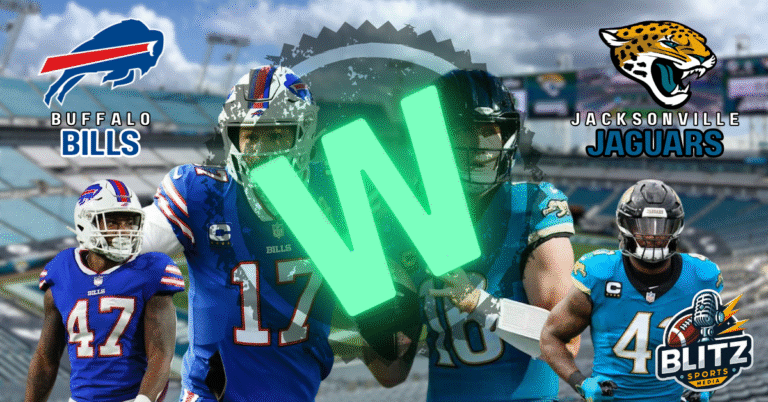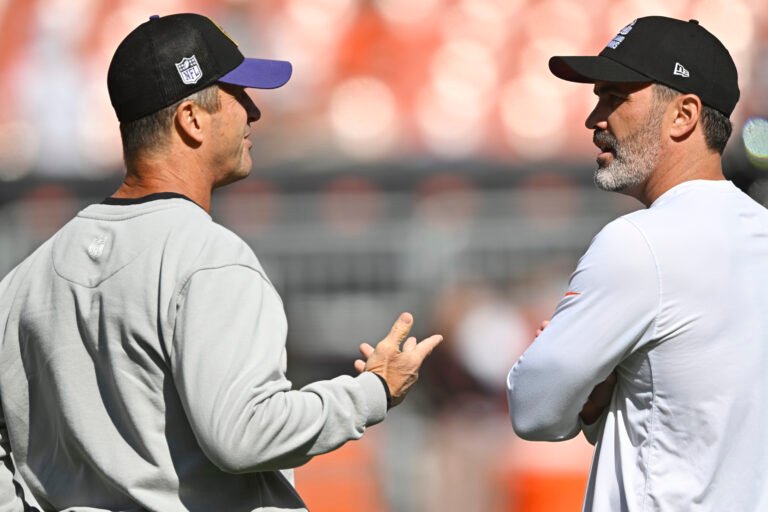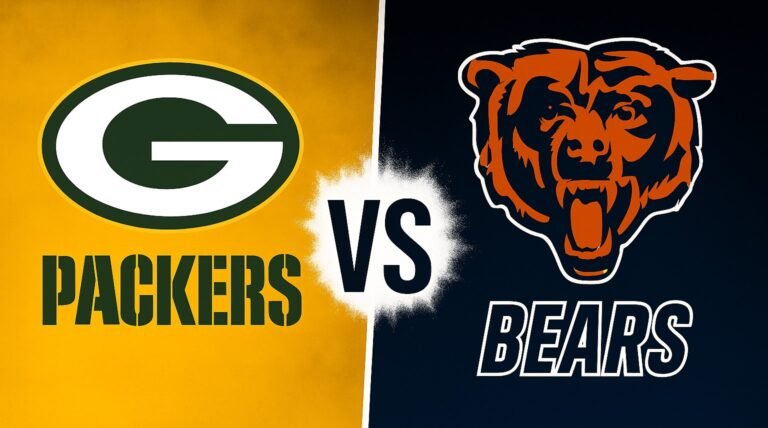The Chicago Bears started the season 0-1 on Monday Night Football at home against the rookie-led Minnesota Vikings. The Bears collapsed in typical Bears fashion, finding ways to lose a game they had in hand. They led 17-6 early in the third quarter before surrendering 21 unanswered points in the fourth, ultimately falling 27-24.
They had all the symptoms: a bend-don’t-break defense that bent too far when it mattered most. Mind you, the defense was without TJ Edwards (hamstring), Kyler Gordon (hamstring), and Jaylon Johnson (groin)—three key starters. Despite that, the unit held Minnesota to just 80 total yards and 0-for-5 on third down in the first half.
The offense started hot, marching down the field on a 10-play opening drive capped by Caleb Williams’ 9-yard rushing touchdown, his first career rushing score, mind you. Williams began the game 10-for-10 passing, the longest streak to start a season opener by a Bears QB since 1976. But after that, the offense sputtered—again, all too familiar to Bears faithful.
The toughest part about that loss? The Vikings didn’t beat the Bears—the Bears beat themselves. Chicago committed 12 penalties for 127 yards, the most in a season opener in franchise history. Pre-snap penalties were especially brutal, with four false starts (two by Jonah Jackson, one by Darnell Wright, and one by DJ Moore). These are death sentences in any offense, but particularly in one that relies heavily on pre-snap motion and timing, hallmarks of Ben Johnson’s scheme as mentioned last week in my preview.
The lack of discipline will be crushing for the Bears moving forward if they don’t get that figured out. Johnson acknowledged postgame, “We said going into Week 1 that the team that would make the least number of mistakes would win the game. Unfortunately, we were on the wrong side of that”.
Additionally, Caleb Williams did not look good after the first quarter. He finished 21-of-35 for 210 yards, with one passing and one rushing touchdown. His completion percentage dropped to 60%, and his off-target throw rate was a league-worst 28.6% 5. His CPOE (Completion Percentage Over Expected) was -8.0%, third-worst in the league, and his accurate throw rate was just 45.7%.
Williams was pressured on only 30.4% of dropbacks, the lowest of his career, meaning the offensive line gave him time, but he failed to capitalize. He also passed up open receivers on eight different plays, a concerning trend for a quarterback expected to take a leap in Year 2.
Ben Johnson’s offense thrives on a few things, as previously stated in the Week 1 Preview: pre-snap motion, precise ball placement, and quarterbacks under center with a heavy rushing threat to open up chunk plays via play-action. But the Bears’ rushing attack was underwhelming. D’Andre Swift managed just 53 yards on 17 carries (3.1 YPC), while Williams led the team with 58 rushing yards on six scrambles.
One thing is for certain after taking a few days to digest Monday night’s game: Chicago will need to be patient with Caleb Williams, because he looked lost for most of the second half. Conversely, Caleb will need to show something to his teammates, coaches, and fans—and that starts with improved body language and leadership, regardless of performance.
LIONS WEEK 1 REVIEW
So what now? The Bears hit the road to take on the defending NFC number one seed Detroit Lions, this Sunday. Typically, this would be a death sentence after how the Bears imploded on Monday night, but the Lions didn’t look that great themselves either. The Lions looked radically different from the team they were last year. Without their offensive and defensive coordinators, Ben Johnson and Aaron Glenn, Detroit looked off, losing to the Green Bay Packers 27-13.
Detroit’s offense, which led the NFL in scoring last season (33.2 points per game), was held to just 13 points and didn’t reach the end zone until the final minute of the game. Quarterback Jared Goff posted solid completion numbers—31-of-39 for 225 yards—but the production was hollow. The Lions averaged just 4.7 yards per pass and failed to stretch the field. The red zone was particularly problematic. Detroit went just 1-for-4 inside the 20-yard line, a steep drop from their 69.4% touchdown conversion rate in 2024.
On the other side of the ball, Kelvin Sheppard’s debut as defensive coordinator was equally rocky. The Lions failed to record a sack and managed only two quarterback hits on Packers QB Jordan Love. Love, who went 16-of-22 for 188 yards and two touchdowns, was never sacked and operated from clean pockets throughout the game.

INJURY REPORT FOR WEEK 2
Chicago enters Week 2 with several key players still questionable: CB Kyler Gordon (hamstring), CB Jaylon Johnson (groin), LB T.J. Edwards (hamstring), and RB Roschon Johnson (undisclosed). DE Austin Booker remains on IR.
Detroit also has injury concerns: OT Taylor Decker (shoulder) and LB Jack Campbell (ankle) did not practice Wednesday. CB Terrion Arnold (groin) and S Daniel Thomas (hand) were full participants, while RB Sione Vaki (hamstring) and LB Trevor Nowaske (elbow) were limited.
KEYS TO VICTORY FOR CHICAGO IN WEEK 2
Limit Penalties: The Bears must clean up their discipline issues if they want any chance of competing in Detroit. Last week’s 12 penalties for 127 yards were not just costly—they were demoralizing. Many of those flags came before the snap, disrupting rhythm and killing drives before they began. In an offense that leans heavily on pre-snap motion, shifts, and timing, even a single false start can derail an entire play. Offensive coordinator Ben Johnson’s scheme is built on precision, and when players are out of sync, the whole system collapses. Playing in a loud road environment like Ford Field only amplifies the challenge. Chicago must emphasize communication, cadence control, and mental focus throughout the week. If they can reduce penalties and stay ahead of the chains, they’ll give themselves a fighting chance.
Establish the Run: A consistent ground game is essential for the Bears to control tempo and keep Detroit’s offense off the field. D’Andre Swift showed flashes last week but was bottled up for most of the night, averaging just 3.1 yards per carry. If Roschon Johnson is healthy enough to play, his physical running style could complement Swift’s agility and provide a much-needed spark. Detroit allowed 78 rushing yards to Green Bay in Week 1, and their front seven looked vulnerable, particularly in gap integrity and tackling. Chicago must take advantage of that by committing to the run early and often. Success on the ground will also open up play-action opportunities for Caleb Williams, giving him cleaner looks and more time to make decisions. A balanced attack will be key to keeping Detroit’s defense guessing and preventing them from teeing off on the young quarterback.
Caleb Williams Must Take a Step Forward: For the Bears to have any chance of winning, Caleb Williams must show growth from his shaky Week 1 performance. His decision-making, accuracy, and pocket awareness all need to improve. Williams missed open receivers on multiple occasions and struggled with ball placement, especially under minimal pressure. Against a Lions defense that failed to generate a pass rush last week, Williams will have opportunities to make plays—he must capitalize. More importantly, his leadership and poise will be under the microscope. A bounce-back performance could not only lift the Bears to victory but also restore confidence in the young quarterback’s trajectory.
PREDICTION FOR WEEK 2
If the Bears are going to bounce back and steal a win on the road in Detroit, the formula is clear: discipline, balance, and quarterback growth. Chicago must eliminate the self-inflicted wounds that plagued them in Week 1—penalties, missed assignments, and mental lapses. A cleaner game, especially in a hostile environment like Ford Field, will allow Ben Johnson’s offense to operate with the rhythm and timing it desperately needs.
Establishing the run early with D’Andre Swift, Kyle Monangai, and potentially Roschon Johnson will be key to controlling the clock and setting up play-action opportunities for Caleb Williams.
Most importantly, Williams must take a noticeable step forward—not just statistically, but in command and confidence. If he can hit open receivers, protect the football, and lead sustained drives, the Bears will be in position to win.
Defensively, the return of key starters like Jaylon Johnson and T.J. Edwards could help contain Jared Goff and a Lions offense that looked out of sync last week. If Chicago can force a turnover or two and capitalize in the red zone, they have a real shot to pull off the upset. In a game that will likely be decided by execution and composure, I am ready to get hurt again, and I’m taking the Bears on the road, being victorious with a 24-17 win, reigniting belief in their young quarterback, and resetting the tone for the season ahead.




